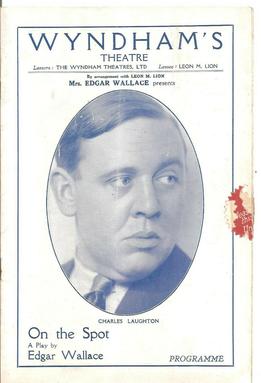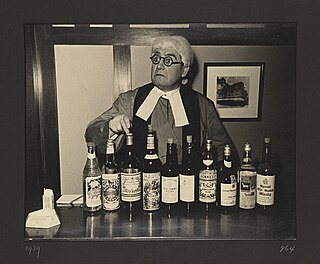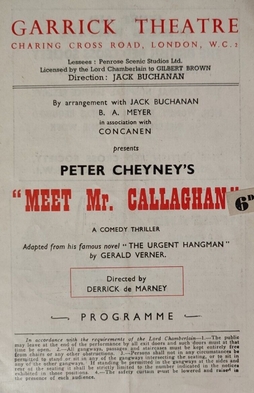Related Research Articles

On the Spot is a 1930 Chicago-set play by the British writer Edgar Wallace. Wallace was inspired by a visit to the United States and, in particular, the Saint Valentine's Day Massacre. Known as a prolific author, he reportedly dictated the manuscript for the play in just four days. It was his greatest theatrical success.
The Mouthpiece is a 1930 crime play by the British writer Edgar Wallace. It was one of several theatrical failures written by Wallace following the enormous success of On the Spot, with a plot described as "flimsy".
The Old Man is a 1931 mystery play by the British writer Edgar Wallace. Its original production was staged at Wyndham's Theatre in London's West End for a ninety performance run. It is set entirely in the "Coat of Arms" tavern where a mysterious old man lurks in the background, reputedly an escapee from a lunatic asylum. The original cast included Alfred Drayton, Jack Melford, Harold Warrender and Finlay Currie.
Persons Unknown is a 1929 mystery play by the British writer Edgar Wallace. The plot revolves around the murder of a "person unknown" in a street by a mysterious blackmailer. It features the character of Sergeant Elk, a Scotland Yard detective who appeared in several of Wallace's novels.
M'Lady is a 1921 play by the British writer Edgar Wallace. It is a drama about a woman who tries to raise her daughter in high society, only for her husband to return from Broadmoor where he has been serving a sentence for killing a police officer. It was panned by theatre critics.
The Terror is a 1927 mystery thriller play by the British writer Edgar Wallace. It is based on Wallace's 1926 novel The Black Abbot.
Smoky Cell is a thriller play by the British writer Edgar Wallace first staged in 1930. In America a group of detectives hunt down a notorious racketeer.
Somebody Knows is a 1932 mystery play by the British writer John Van Druten about an entertainer who is accused of strangling a prostitute. Following a court case there is not enough evidence to convict him, leaving the audience unsure of his actual guilt.

The Unguarded Hour is a 1935 play by Bernard Merivale, inspired by a Hungarian work by Ladislas Fodor.

Blondie White is a 1937 mystery play by British writer Jeffrey Dell and Bernard Merivale. A murder mystery, it was inspired by an earlier play by Hungarian writer Ladislas Fodor. A famous crime novelist helps Scotland Yard to solve the murder of a nightclub performer, Blondie White.

A Murder Has Been Arranged is a 1930 thriller play by the British writer Emlyn Williams.

The Amazing Dr. Clitterhouse is a 1936 thriller play by the British writer Barré Lyndon. The lead character's name is a play on the term for the female sexual organ the clitoris - a name characterised by the "yearning, untrammelled nature" of Clitterhouse himself; an extremely daring pun for 1936, yet seemingly anticipated by Lyndon to escape the notice of the contemporary censor. Lyndon wrote, "My view was that he was no more likely to locate the pun in my title as to locate the source of it on his beloved bedfellow".
Vanity Fair is a 1946 play by the British writer Constance Cox, based on William Makepeace Thackeray's novel of the same name.

Lord Arthur Savile's Crime is a 1952 comedy thriller play by the British writer Constance Cox, based on the short story Lord Arthur Savile's Crime by Oscar Wilde. After a palm reader convinces him it is his destiny to commit murder before he can marry his fiancée, an aristocrat makes several inept attempts to kill people.

Dangerous Curves is a 1953 thriller play by the British writer Gerald Verner. It is adapted from the 1939 novel of the same title by Peter Cheyney featuring the private detective Slim Callaghan. It followed the success of Verner's 1952 stage play Meet Mr. Callaghan. It premiered at the Garrick Theatre in London's West End, where the previous play had been staged, and ran for 53 performances between 14 April and 11 June 1953. The cast included Terence De Marney as Callaghan, Shaw Taylor, Stephen Dartnell and Paul Whitsun-Jones.

Meet Mr. Callaghan is a 1952 crime thriller play by the British writer Gerald Verner. It was adapted from the novel The Urgent Hangman by Peter Cheyney featuring the private detective Slim Callaghan. It premiered at the Kings Theatre in Southsea before transferring to the Garrick Theatre in London's West End where it ran for 340 performances between 27 May 1952 and 4 April 1953. The cast included Terence De Marney as Callaghan, Larry Burns, Jack Allen, Trevor Reid, John Longden, Lisa Daniels, Harriette Johns and Simone Silva. In 1953 Verner wrote another stage play featuring Callaghan, Dangerous Curves based on Cheyney's novel of the same title.

Ten Minute Alibi is a 1933 crime thriller play by the British author Anthony Armstrong. It premiered at the Embassy Theatre in Swiss Cottage before transferring to London's West End. It ran for 857 performances between 8 February 1933 and 26 January 1935, initially at the Haymarket Theatre before switching to the Phoenix Theatre. The London cast included Anthony Ireland, Robert Douglas, Bernard Lee, George Merritt, Charles Hickman, Celia Johnson, Jessica Tandy, Gillian Maude and Aileen Marson. It was directed by Sinclair Hill. A Broadway version at the Ethel Barrymore Theatre ran for 89 performances.

Without Witness is a mystery thriller play by the British authors Anthony Armstrong and Harold Simpson. It premiered at the Embassy Theatre in Swiss Cottage on 27 December 1933 before transferring to the Duke of York's Theatre in London's West End where it ran for 75 performances between 12 March and 12 June 1934, having been revised slightly from its Embassy premiere. The West End cast included Nicholas Hannen, Arthur Wontner, Bernard Lee, Frederick Piper, Hugh E. Wright, Joan Marion and Marion Fawcett.

Murder Mistaken is a 1952 thriller play by the British author Janet Green. It first appeared at the Prince of Wales Theatre in Cardiff under the title Teddy Bare's Picnic. It then transferred to London's West End under its new title first at the Ambassadors Theatre and then at the Vaudeville Theatre. It's West End run lasted 156 performances between 4 November 1952 and 28 March 1953. The West End cast included Derek Farr, Anthony Marlowe, Phyllis Morris, Iris Hoey, Brenda de Banzie, Patricia Burke and Rosalie Crutchley. It appeared on Broadway under the alternative title Gently Does It, lasting for thirty seven performances at the Playhouse Theatre. Green wrote a novelisation in 1953 with Leonard Gribble.

Laughter in Court is a 1936 comedy play by the British writher Hugh Mills. It premiered at the Grand Theatre, Blackpool before transferring to the Shaftesbury Theatre in London's West End where it ran for 117 performances. The West End cast included Yvonne Arnaud, Ronald Squire, Evelyn Roberts, Edmund Breon and Wilfrid Caithness. It was one of a number of plays of the era with courtroom settings.